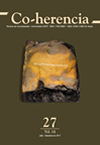Pre-Columbian Literature between the ancestral and colonial perspectives
Main Article Content
Keywords
pre-Columbian literature, oral literature, transcription, adaptation, interpolation, cultural memory, Pre-Columbian literature, oral literature, transcription, adaptation, interpolation, cultural memory.
Abstract
This paper questions whether it is possible to talk about pre-Columbian literatures, considering that those woks are the result of a complex literacy process carried out during the colonial period. This approach is a classification proposal that differentiates transcripts, adaptations and interpolations, such as possible procedures in the progressive composition of the pre-Columbian literary corpus, in consonance with the greater or lesser presence of foreign or colonial elements within the oral ancestral tradition. Yet, whether understood as Western written versions of the pre-Hispanic orality or as colonized cultural memory, the pre-Columbian literatures are an aesthetic and cultural reality that claims far greater attention in the field of literary studies.
Downloads
References
Amores, J. (2006). Historia de América. Barcelona: Ariel.
Assmann, J. (2008). Communicative and Cultural Memory. En A. Erll & A. Nünning (Eds.), Cultural Memory Studies: An International and Interdisciplinary Handbook (pp. 109-118). Berlin-New York: De Gruyter.
Baudot, G. (1979). Las letras precolombinas. México: Siglo XXI.
Boone, E. (1994). Introduction: Writing and recorded knowledge. In E. Boone & W. Mignolo (Eds.), Writing without words: Alternative literacies in Mesoamerica and the Andes (pp. 3-26). Durham, NC: Duke University Press.
Candau, J. (2006). Antropología de la memoria. Buenos Aires: Nueva visión.
Colombres, A. (2013). Palabra y artificio. Las literaturas bárbaras. En A. Pizarro (Ed.), América latina: palabra, literatura y cultura (pp. 159-216).
Cortez, O. (2008). Intertextualidad y paralelismo entre el Popol Vuh y la Biblia. Espéculo. Revista de Estudios Literarios. Recuperado de http://pendientedemigracion.ucm.es/info/especulo/numero40/popolbi.html
Hachim, L. (2010). Diálogo de la poesía: flor y canto. Recuperado de https://jorgecaceresr.wordpress.com/page/3/
Kollenberger, C. (1996). Códices y escritura en América Precolombina. Boletín Bibliotecológico de La Plata (4), 25-35. Recuperado de http://hdl.handle.net/10915/10327
Mignolo, W. (1994). Afterword. Writing and recorded knowledge in colonial and postcolonial situations. In E. Boone & W. Mignolo (Eds.), Writing without words: Alternative literacies in Mesoamerica and the Andes (pp. 292-312). Durham, NC: Duke University Press.
Prem, H. y Dickerhoff, U. (1997). Los Anales de Tlatelolco. Una colección heterogénea. Revista Estudios de Cultura
Náhuatl (27), 181-207. Recuperado de https://dialnet.unirioja.es/servlet/articulo?codigo=2262333&orden=311281&info=link
Ricouer, P. (2003) Memória, História, Esquecimento. Conferencia ofrecida en Budapest bajo el título “Memory, history, oblivion” en el ámbito de la Conferencia Internacional denominada “Haunting Memories? History in Europe after Authoritarianism”. Recuperado de: http://www.uc.pt/fluc/lif/publicacoes/textos_disponiveis_online/pdf/memoria_historia
León-Portilla, M. (1972). Trece poetas del mundo azteca. México: Secretaría de Educación Pública.
León-Portilla, M. (1986). Cantos y crónicas de México antiguo. Madrid: Colección Crónicas de América N°. 24.
León-Portilla, M. (1992). Literaturas indígenas de México. Madrid: Mapfre.
Rabasa, J. (2011). Tell Me the Story of How I Conquered You. Elsewheres and Ethnosuicide in the Colonial Mesoamerican World. Austin: University of Texas Press.
Ramos, G. & Yannakakis, Y. (2014) Indigenous Intellectuals. Knowledge, Power, and Colonial Culture in Mexico and the Andes. Durham/London: Duke University Press.
Recinos, A. (1992). Introducción al Popol Vuh. En M. Garza (Comp.), Literatura Maya (2ª ed.). Caracas: Biblioteca Ayacucho.
Tomlinson, G. (2007). The Singing of the New World: Indigenous Voice in the Era of European Contact. Cambridge: Cambridge University Press.
Valencia, C. (1998). Teatro precolombino: el ritual y la ceremonia. Revista de ciencias humanas, 5(17), 29-38.




